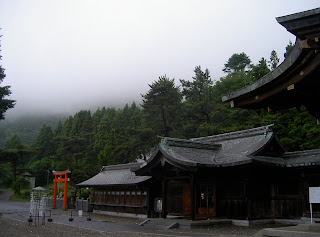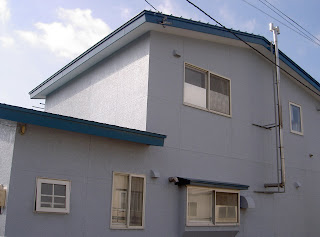During my final week or so in Hakodate, the annual port festival was underway. The most memorable night of the festival was definitely that of the parade. In the afternoon, I visited my classmates Ngo-san and Lu-san, who lived in a small buddhist temple near the coast, in the shadow of Mt. Hakodate, with their host mother who was the temple's caretaker. I helped them walk the three family dogs before we went to the parade together with their host mother. Wesat on the side of the road watching the parade for several hours as dozens of elaborate floats and everyone from elementary schoolers to bank employees danced by, and at the very end we (and many other HIFers) joined hundreds of Hakodate residents in dancing the "イカ踊り" (ika odori) or squid dance through the streets.
On the morning of my departure, oniisan, okaasan, Sana and Kousuke all came to see me off at the train station, and in front of Hakodate eki, I somewhat tearfully stumbled through the formal phrases of my goodbye: この二ヶ月の間、色々どうもありがとうございました。本当に、大変お世話になりました。"For these two months, thank you very much for everything. I truly came into your care (and I am very grateful.)" The translation of the second sentence is awkward, but there isn't an English equivalent to acknowledge the receiving of a favor or kindness that has the same weight to it as "osewa ni naru" does in Japanese.
That day, Max and I stopped in Sendai and had lunch at a tiny ramen shop. The city apparently holds its Tanabata festival a month later than the rest of Japan, and it was still going on when we arrived, so the station and streets were adorned with very impressive, enormous, colorful hanging paper sculptures. After exploring for a little while, we took a local train thirty minutes out to Matsujima, a group of 260 tiny, pine-covered islands, historically ranked as one of Japan's 3 most beautiful sights and spent a few hours walking around there before hopping on a bullet train towards Tokyo.
In the final hectic weeks of independent study presentations, parades, the port festival, and studying for the final exam, time to assess my overall Japanese progress was scarce. As I spent my final few days in Japan traveling south from Hakodate to Tokyo however, I began to realize just how far I had come. The once-challenging task of navigating unfamiliar places had become as easy as if I were in America. Getting a little lost became, rather than stressful and frightening, just another opportunity for an interesting adventure.
The Hokkaido International Foundation's program ended two weeks ago already, but I know that the process of reflecting on my time in Japan is only just beginning, and I will certainly remember the experience for the rest of my life. I would like to thank my host family, the HIF teachers and staff, and most importantly, the Light Fellowship for making this wonderful opportunity possible for me.
Once again: みんなさん、色々どうもありがとうございました。本当に大変お世話になりました。






































